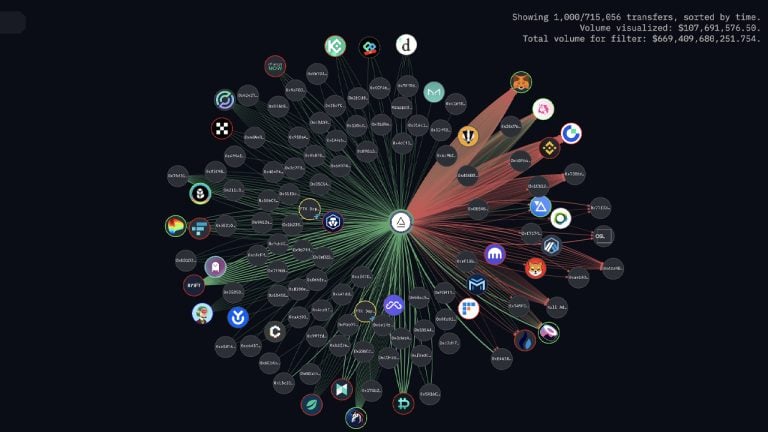 This week, FTX debtors issued a press release and a 20-page document noting that bankruptcy administrators had located $5.5 billion in liquid assets. The document details that investigators discovered fiat currencies, crypto assets, and securities as part of FTX’s and Alameda Research’s cache. However, the disclosure to unsecured creditors does not mention the extremely large […]
This week, FTX debtors issued a press release and a 20-page document noting that bankruptcy administrators had located $5.5 billion in liquid assets. The document details that investigators discovered fiat currencies, crypto assets, and securities as part of FTX’s and Alameda Research’s cache. However, the disclosure to unsecured creditors does not mention the extremely large […] Two days ago, bankruptcy administrators and FTX debtors published an update for unsecured creditors claiming the discovery of $5.5 billion in liquid assets. Roughly $3.5 billion of these funds are cryptocurrency assets, with 11 different digital currencies classified as “liquid assets.” However, two of the firm’s top cryptocurrency caches are not liquid as the company’s […]
Two days ago, bankruptcy administrators and FTX debtors published an update for unsecured creditors claiming the discovery of $5.5 billion in liquid assets. Roughly $3.5 billion of these funds are cryptocurrency assets, with 11 different digital currencies classified as “liquid assets.” However, two of the firm’s top cryptocurrency caches are not liquid as the company’s […] Following the launch of Donald Trump’s non-fungible token (NFT) card collection, winners of the Trump-themed prizes are selling prize NFTs on secondary NFT marketplaces such as Opensea. The Polygon-minted NFTs act as passes for a one-on-one Zoom meeting with the 45th president of the United States and a gala dinner with Trump. During the past […]
Following the launch of Donald Trump’s non-fungible token (NFT) card collection, winners of the Trump-themed prizes are selling prize NFTs on secondary NFT marketplaces such as Opensea. The Polygon-minted NFTs act as passes for a one-on-one Zoom meeting with the 45th president of the United States and a gala dinner with Trump. During the past […] A New York bankruptcy court has ruled the deposits on high-interest-earning accounts belong to Celsius, the embattled former cryptocurrency lending firm, that filed for Chapter 11 bankruptcy protections in July. The decision establishes a precedent that might affect the status of other, similar cases involving crypto companies like Blockfi and FTX. Celsius Obtains Ownership of […]
A New York bankruptcy court has ruled the deposits on high-interest-earning accounts belong to Celsius, the embattled former cryptocurrency lending firm, that filed for Chapter 11 bankruptcy protections in July. The decision establishes a precedent that might affect the status of other, similar cases involving crypto companies like Blockfi and FTX. Celsius Obtains Ownership of […] Just recently, the crypto community discovered a bitcointalk.org forum user who signed a message from bitcoin block 1,018, and the signer associated the signature with an address first seen in 2022. Moreover, further investigation and evidence have tied block 1,018 to the now-deceased computer scientist Hal Finney’s bitcoin transactions. Two days ago, another signature and […]
Just recently, the crypto community discovered a bitcointalk.org forum user who signed a message from bitcoin block 1,018, and the signer associated the signature with an address first seen in 2022. Moreover, further investigation and evidence have tied block 1,018 to the now-deceased computer scientist Hal Finney’s bitcoin transactions. Two days ago, another signature and […]
The survey took place in the EU's major economic areas such as France, Germany, Italy, Spain, Belgium, and the Netherlands.
On Tuesday, the European Central Bank, or ECB, published the results of a new survey conducted in six eurozone areas; the Netherlands, Spain, Italy, Belgium, France, and Germany. Together, approximately 10% of respondents from the surveyed countries said they own cryptocurrencies. Out of this group, only 6% of respondents said they own digital assets worth more than 30,000 euros. Meanwhile, 37% of respondents said they owned up to 999 euros in crypto.
Across all of the countries surveyed, investors in the fifth income quintile (or the wealthiest 20% of the population) consistently had the highest proportion of cryptocurrency ownership relative to other income groups. The Consumer Expectation Survey asked adults aged 18 to 70 if they or anyone in their household owned financial assets in various categories, such as crypto-assets.
The survey was included in a new report published by the ECB the same day regarding the growing adoption of crypto assets despite their risk factors. As cited by the ECB, 56% of respondents in a recent Fidelity survey said they had some exposure to crypto-assets, up from 45% in 2020. Increased availability of crypto-based derivatives and securities on regulated exchanges, such as futures, exchange-traded notes, exchange-traded funds, and OTC-traded trusts, have contributed to the momentum.
In addition, increased regulation has been taken as a sign that public authorities endorse crypto. As an example, the ECB cited Germany allowing institutional funds to invest up to 20% of their holdings in crypto. However, the ECB highlighted at the end of the report that if current trends in digital asset adoption continue, then they will eventually pose a threat to financial stability.
 A government official in Rivne region of Ukraine owns close to $8 million in cryptocurrency and 500 Tesla shares, his declaration shows. The news comes as another Ukrainian lawmaker in Kyiv has found it hard to prove possession of the crypto holdings on her asset statement. Ukraine Officials Declare Crypto Assets, Fail to Provide Proof […]
A government official in Rivne region of Ukraine owns close to $8 million in cryptocurrency and 500 Tesla shares, his declaration shows. The news comes as another Ukrainian lawmaker in Kyiv has found it hard to prove possession of the crypto holdings on her asset statement. Ukraine Officials Declare Crypto Assets, Fail to Provide Proof […] According to the latest Finder Cryptocurrency Adoption Index, in October 2021, Nigeria had the highest rate of cryptocurrency ownership globally, at 24.2%. Bitcoin Is the Most Popular Coin in Nigeria In addition to finding the West African nation as the country with the highest proportion of citizens that hold cryptocurrencies globally, the survey also discovered […]
According to the latest Finder Cryptocurrency Adoption Index, in October 2021, Nigeria had the highest rate of cryptocurrency ownership globally, at 24.2%. Bitcoin Is the Most Popular Coin in Nigeria In addition to finding the West African nation as the country with the highest proportion of citizens that hold cryptocurrencies globally, the survey also discovered […]
Three design flaws in blockchain tech are holding the NFT sector back — and they need to be tackled for it to reach its full potential.
Years after CryptoKitties were released to the masses, the nonfungible token (NFT) sector is finally going places.
Coveted collectibles are selling for millions of dollars in some of the world’s finest auction houses. Top-flight soccer and basketball teams are releasing once-in-a-lifetime moments that fans cherish. Movie studios are starting to issue NFTs as memorabilia too, unlocking new revenue streams when they are needed most.
It’s little wonder that NFT-focused companies are attracting eye-watering valuations. Just take a look at Sorare, which is on track to secure a price tag of at least $3.8 billion through its latest funding round. Although there have been endless proclamations that a bubble is forming in this nascent space, big brands are convinced these assets have staying power. Let’s not forget the countless use cases for NFTs that have yet to be discovered, too.
Unfortunately, a dark cloud is hovering on the horizon — and it’s one that risks holding the NFT sector back. Right now, blockchain technology doesn’t provide anywhere near enough value propositions to motivate a user to own these crypto collectibles. If the market is going to proliferate — and attract everyday users — the industry needs to tackle three key design issues.
Let’s imagine you own an NFT that represents a beautiful piece of artwork by a celebrated painter. In all likelihood, you would have paid a pretty penny for it.
But here’s the problem: That crypto collectible is completely worthless without the existence of the underlying asset it’s meant to represent. Right now, there is a huge cost to permanently store the high-resolution image data that gives such NFTs their value. The problem is exacerbated even further when you take videos into account.
Related: NFTs make it possible for gamers to have digital property rights
Without the right incentives, blockchain nodes responsible for protecting these files may not function as they should, and this could cause NFT data to be lost irretrievably. It’s one thing to pay $1 million for a rare nonfungible token — it’s quite another to lose that investment because of circumstances that lie out of your control.
The best approach to solving this problem is to ensure that economic incentives are more widely distributed whenever NFTs are sold — beyond the token’s original creator, the seller or the marketplace facilitating the transaction. Nodes should be given a cut of the profits too.
Even if this design flaw is speedily addressed, others arise that could undermine the value of a rare NFT. At present, most content protection mechanisms used for digital assets are either nonexistent or weak. The data underpinning digital collectibles is typically stored on centralized file servers, which increases the likelihood of hacking — or exclusive data being shared illegally.
Related: To change the art industry, NFTs must be more secure
For an NFT to be truly valuable, only its owner should be able to see and enjoy the data that’s contained within. Implementing digital rights management, or DRM, would help to protect an investment, and it could help assuage some of the concerns surrounding what marketplaces are actually selling. This approach wouldn’t be too dissimilar to the approach that Apple took when it launched its iTunes Store, adding DRM to music to ensure that it was rightfully the owner’s track and nobody else’s.
Last but by no means least, we need to reflect on the fact that NFTs cannot be exchanged — and this means that once they’re lost or stolen, the damage is permanent.
If nonfungible tokens are going to become a dominant force in the coming decades, we need to create a mechanism where NFTs can be inherited — allowing coveted digital assets to be passed from one generation to the next. We shouldn’t bind the ownership of an NFT to a private key — instead, a blockchain should tie these rights directly to someone’s identity. This will help future-proof this asset class and ensure that control is never lost.
Related: Will regulation adapt to crypto, or crypto to regulation? Experts answer
We already live in a world where information is lost at alarming rates. Millions of web pages — filled with vivid stories, photos and videos — have already been taken down and lost forever. To let the same thing happen to NFTs would be a travesty.
Now is the time to act. The NFT industry is still at an early phase, and sweeping improvements can be made before we advance to mass adoption. Failing to tackle these design flaws could ultimately stymie the size of this industry years down the line and cause sizable headaches for those who have invested in tokens worth more than houses.
This article does not contain investment advice or recommendations. Every investment and trading move involves risk, and readers should conduct their own research when making a decision.
The views, thoughts and opinions expressed here are the author’s alone and do not necessarily reflect or represent the views and opinions of Cointelegraph.